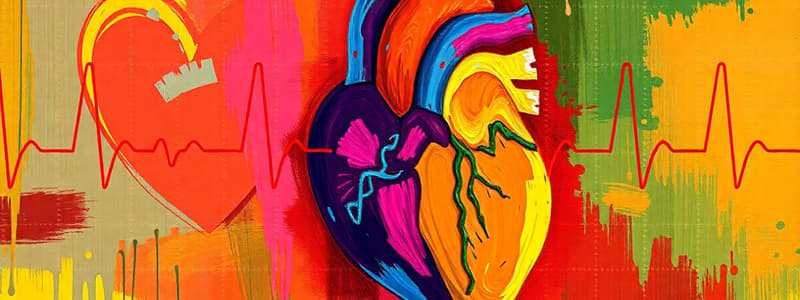Podcast
Questions and Answers
Which structure carries oxygenated blood to the heart?
Which structure carries oxygenated blood to the heart?
- Pulmonary arteries
- Right atrium
- Pulmonary veins (correct)
- Veiny Vampires
What is the primary function of the bundle of His?
What is the primary function of the bundle of His?
- To carry deoxygenated blood
- To distribute electrical impulses (correct)
- To pump blood to the body
- To regulate heart rate
Which part of the heart receives deoxygenated blood from the body?
Which part of the heart receives deoxygenated blood from the body?
- Left ventricle
- Right ventricle
- Left atrium
- Right atrium (correct)
What is the normal heart rate range for Purkinje fibers?
What is the normal heart rate range for Purkinje fibers?
What is described as carrying dead (deoxygenated) blood to the heart?
What is described as carrying dead (deoxygenated) blood to the heart?
Which structure conducts electrical impulses after the bundle of His?
Which structure conducts electrical impulses after the bundle of His?
Which chamber of the heart pumps oxygenated blood to the body?
Which chamber of the heart pumps oxygenated blood to the body?
Where does the right bundle branch direct impulses?
Where does the right bundle branch direct impulses?
What is the heart rate range for the AV Node?
What is the heart rate range for the AV Node?
Which is NOT a function of arteries?
Which is NOT a function of arteries?
What is the primary purpose of an electrocardiogram (EKG)?
What is the primary purpose of an electrocardiogram (EKG)?
Which of the following is NOT an indication for performing an EKG?
Which of the following is NOT an indication for performing an EKG?
What does a HOLTER Monitor do?
What does a HOLTER Monitor do?
Which component of the EKG represents atrial activity?
Which component of the EKG represents atrial activity?
What is the typical heart rate range indicated by the SA Node?
What is the typical heart rate range indicated by the SA Node?
Which term describes the irregular heart rhythms detectable by EKG?
Which term describes the irregular heart rhythms detectable by EKG?
Which of the following is an inappropriate action regarding copyright material?
Which of the following is an inappropriate action regarding copyright material?
Which element of the EKG reflects ventricular depolarization?
Which element of the EKG reflects ventricular depolarization?
Flashcards are hidden until you start studying
Study Notes
EKG basics
- EKG stands for electrocardiogram, it is also known as ECG
- EKG records the electrical signals of the heart
- This test helps identify arrhythmias, blocked arteries (CAD, MI), and assess how well pacemakers or cardiac medications function
- A Holter monitor records a continuous EKG for 24-48 hours when a standard EKG is inconclusive
Electrical Conduction System
- P Wave: Represents atrial depolarization
- QRS Complex: Represents ventricular depolarization
- SA Node: - sets the heart rate: 60 to 100 beats per minute (bpm)
- AV Node: - if SA node fails, the AV steps in: 40 to 60 bpm
- Bundle of His: - transmits the signal to the ventricles: 40 to 60 bpm
- Left Bundle Branch: - carries the signal to the left ventricle
- Right Bundle Branch: - carries the signal to the right ventricle
- Purkinje Fibers: - conduct the signal throughout the ventricles: 20 to 40 bpm
The Heart
- Right Atrium receives deoxygenated blood from body tissues via veins
- Left Atrium receives oxygenated blood from lungs via veins
- Right Ventricle pumps deoxygenated blood to the lungs via the pulmonary artery
- Left Ventricle pumps oxygenated blood to the body via the aorta
Studying That Suits You
Use AI to generate personalized quizzes and flashcards to suit your learning preferences.




